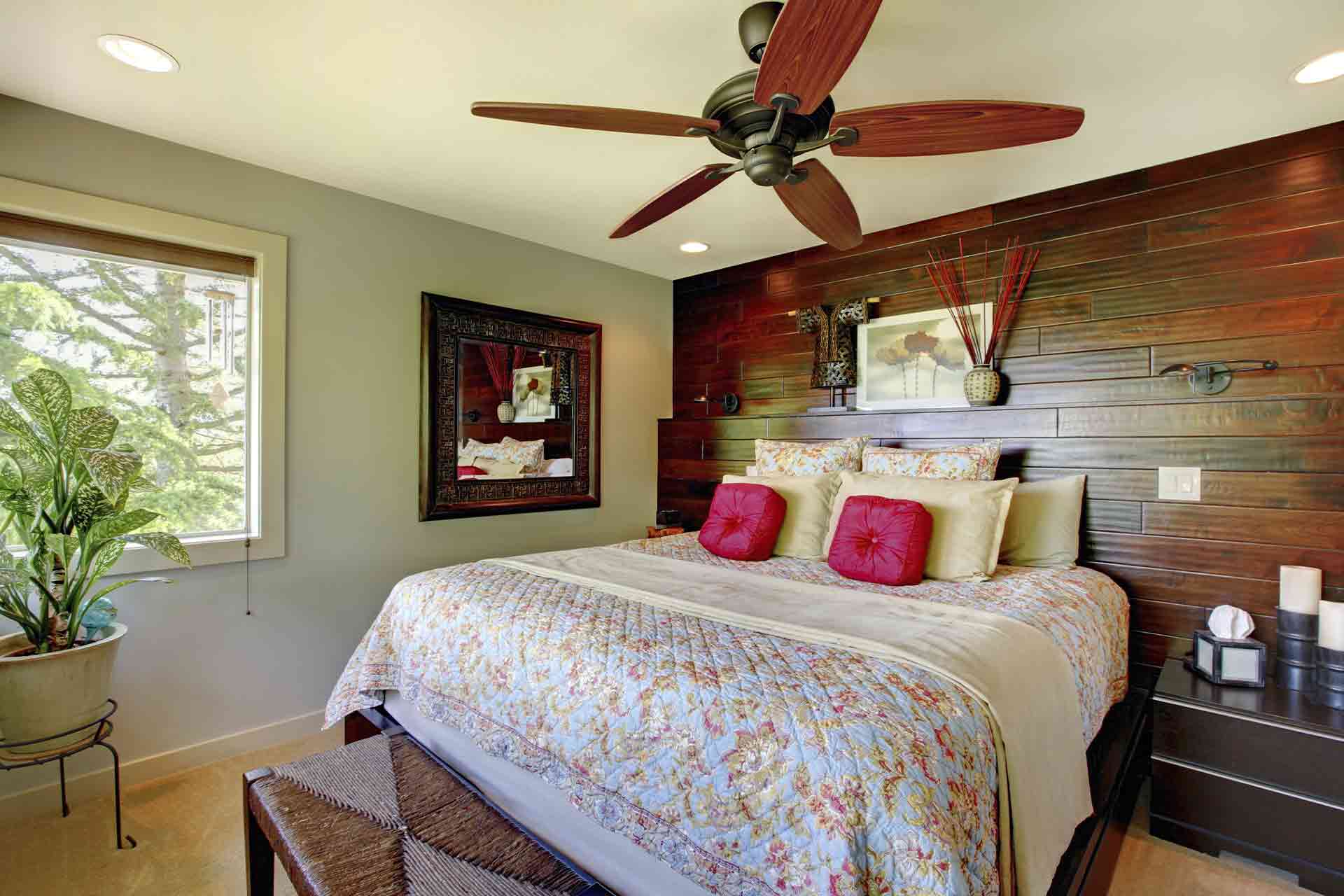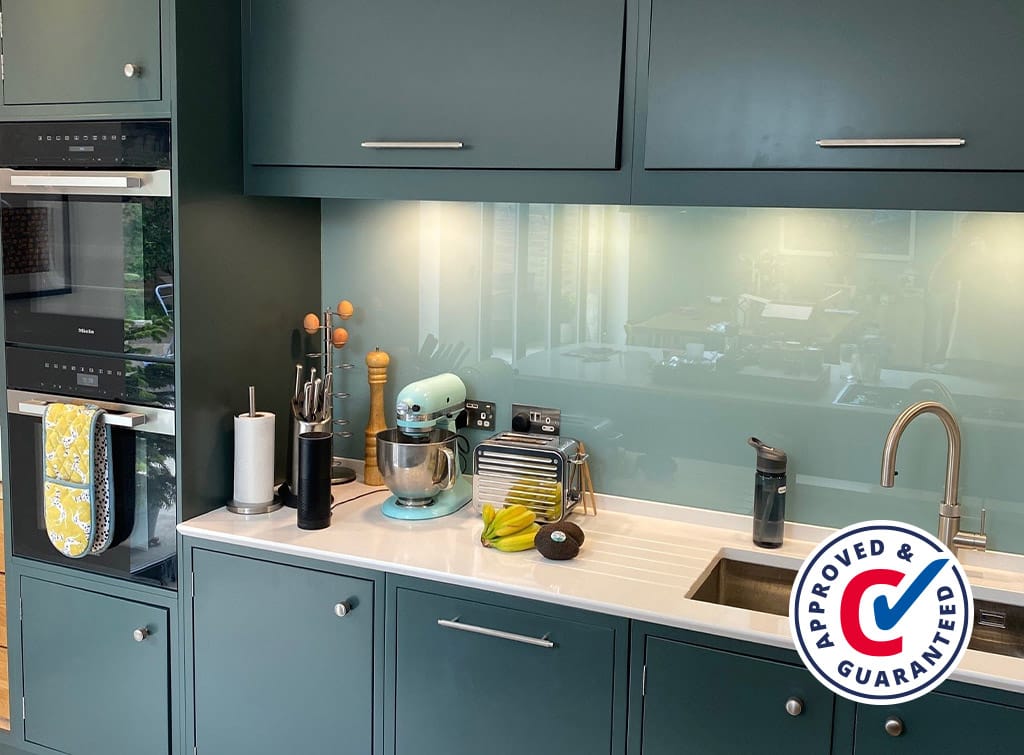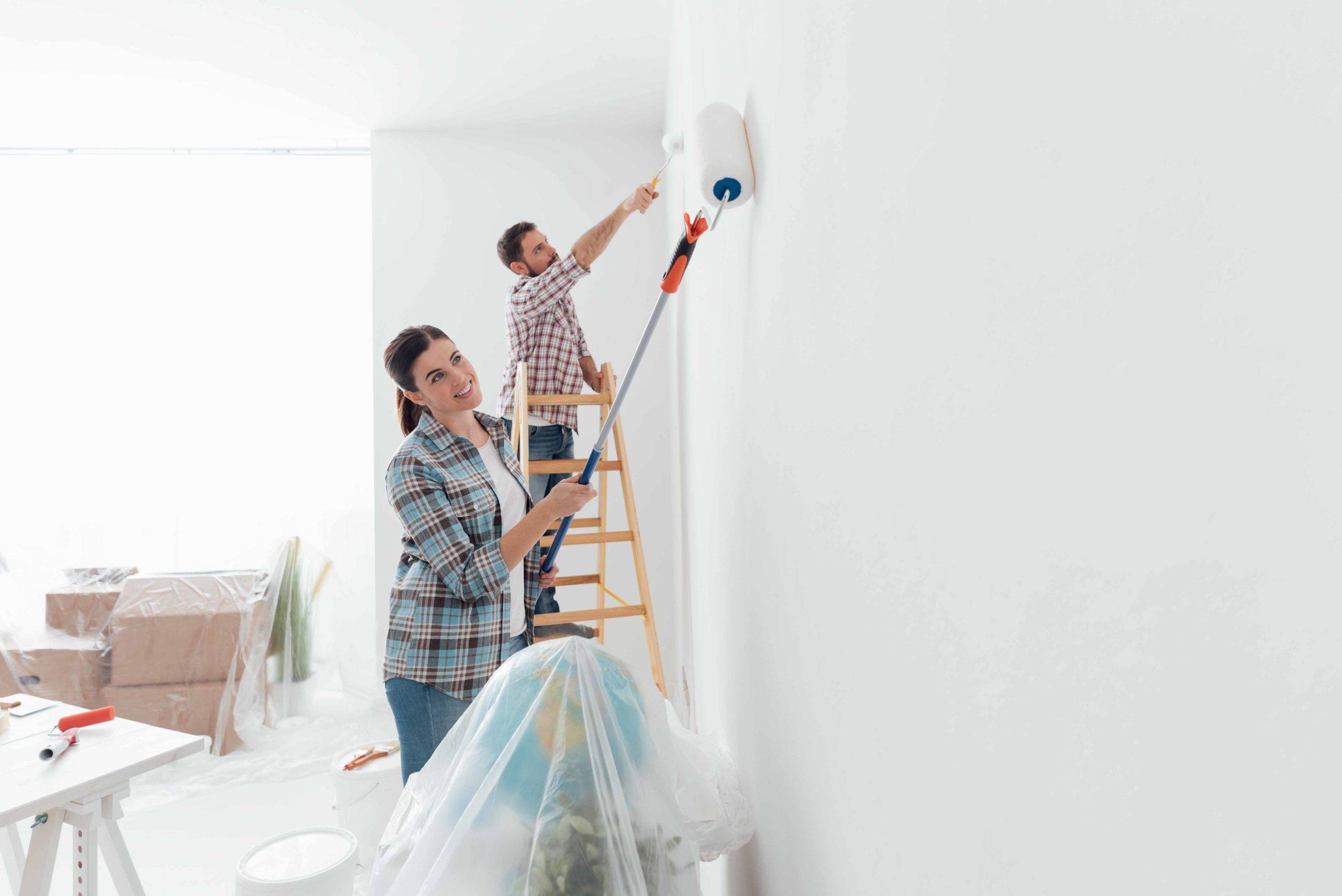Blog>Expert Advice>Buying guide: helping you choose the perfect kitchen wall paint
Last updated: 13 December 2024
Buying guide: helping you choose the perfect kitchen wall paint
Looking to paint your kitchen? Tick off all the style, durability and cost considerations for kitchen wall paint in this handy buying guide.

Kitchen wall paint needs to stand up to a lot of wear and tear. After all, the kitchen is one of the most frequently used rooms in the home.
Add to that grease and moisture build-up, and it's no surprise that mould and paint bubbling can be common problems.
Here, we run through the most durable and moisture-resistant paints, so you can get your kitchen wall paint project right the first time.
We also share tips on finding a painter decorator to help get that professional finish using our free Checkatrade directory.
See the tradespeople we've checked and recommend for your job
Why choosing the right kitchen wall paint matters
Our kitchens are high-traffic areas we use daily, and the walls can easily be marked and stained. It's all going on, from heat and moisture exposure to grease build-up, spills, and splashes.
That’s why, when it comes to picking kitchen wall paint, a standard vinyl or emulsion won’t cut it – however much you’ve fallen in love with a particular colour (or the price!).
Kitchen wall paints need to be:
Easy-to-clean – So you can wipe down any food splatters
Long-lasting – A high-quality and washable kitchen paint can last for five to seven years before you need to think about repainting
Moisture-resistant – Kitchens are prone to high humidity and moisture from cooking, boiling water, and washing up, which can lead to mould build-up and paint bubbling
Grease and stain resistant – Kitchens inevitably build up grease on surfaces over time. Kitchen paints are tough on grease and dirt, keeping the walls looking fresher
But how do you know what paint is most suitable for your kitchen and what the different finishes are? That’s all up next.

Best types of paint for kitchen walls
These days, there’s a mind-boggling array of kitchen wall paints to buy from any good DIY store. Things to consider include:
Different colours
Different finishes
Extras (such as glitter)
Specialist paints for particular issues like condensation
But here's the thing to know – you don’t necessarily need a specialist kitchen wall paint.
While bog-standard vinyl paint isn't suitable because it's too porous and stains easily, plenty of other hardwearing paints are just as effective for your kitchen walls – even if it doesn't say it on the tin!
Let’s look at the most common options and the pros and cons of each to help you narrow down your choice:
Durable matt emulsions
This type of paint is suitable for any wall in the home, so it works well for an open-plan living and kitchen space.
Dulux Trade's Diamond Matt range comes highly recommended by decorators, as does Crown's Clean Extreme. Just look out for phrases like 'easy-care' and 'clean extreme'; then you'll know they are hard-wearing and made for cleaning.
Application:
Drying time is between four to six hours
You’ll need two coats
Pros:
Wipeable finish as it usually contains acrylic binders rather than vinyl
Stain-resistant qualities
Affordable prices
Cons:
Might not be as hardwearing as some of the more specialist paints listed below
Acrylic eggshells
Again, this is another paint that can be used on any interior wall in the home, but it has a sheen finish. Johnstone's Trade Acrylic Eggshell or Armstead's Eggshell are cost-effective options.
Application:
Drying time can be as little as three hours
If the walls are already painted and in a similar colour, you may only need one coat
Pros:
Fast-drying, this will suit homeowners looking for a quicker paint job
The polymers in it help to stand up to steam and grease
It can also be applied to woodwork, so you can spruce up your kitchen skirting boards in the same colour, too!
Kitchen wall paint
Kitchen wall paint is designed to be tough on grease and food stains and is washable without your wall paint colour fading. All the leading brands have a kitchen wall paint option or a paint that doubles up for bathrooms and kitchens.
Application:
Drying time could be up to six hours
You’ll need two coats
Pros:
Comes in a variety of different colours
Cons:
Normally, it only comes in a matt finish, which won’t suit everyone
Anti-mould and anti-condensation paints
Moisture-resistant wall paint is a step up from the wall paints listed above. It works well in smaller kitchens where ventilation and mould build-up are recurring problems. The Zinsser brand does a good range in this.
Application:
Dry time can be as little as one to two hours
On previously painted surfaces, you may only need one coat
Pros:
Designed to resist mould, cracking, peeling, and blistering
Comes in matt and satin finishes, though there are fewer colour choices
Is easily washable
Cons:
Tends to be more expensive than standard wall paints
As it’s a specialist paint, it might not be as readily available in DIY stores compared to the options above
Is mould and condensation a reoccurring in your kitchen? Unfortunately, it will take more than a paint change to sort out the problem. You’ll also want to take a look at your kitchen’s ventilation. Check out our home ventilation solutions guide for more information.
Top kitchen wall paint colours for 2025
Now that you’ve decided on the type of paint you want, you can focus on the fun bit – picking a colour!
Whether you’re drawn to bold, dramatic colour pops or soft, neutral shades, there’s a colour out there to suit your kitchen’s colour scheme.
Here are some tips to narrow down your palette.
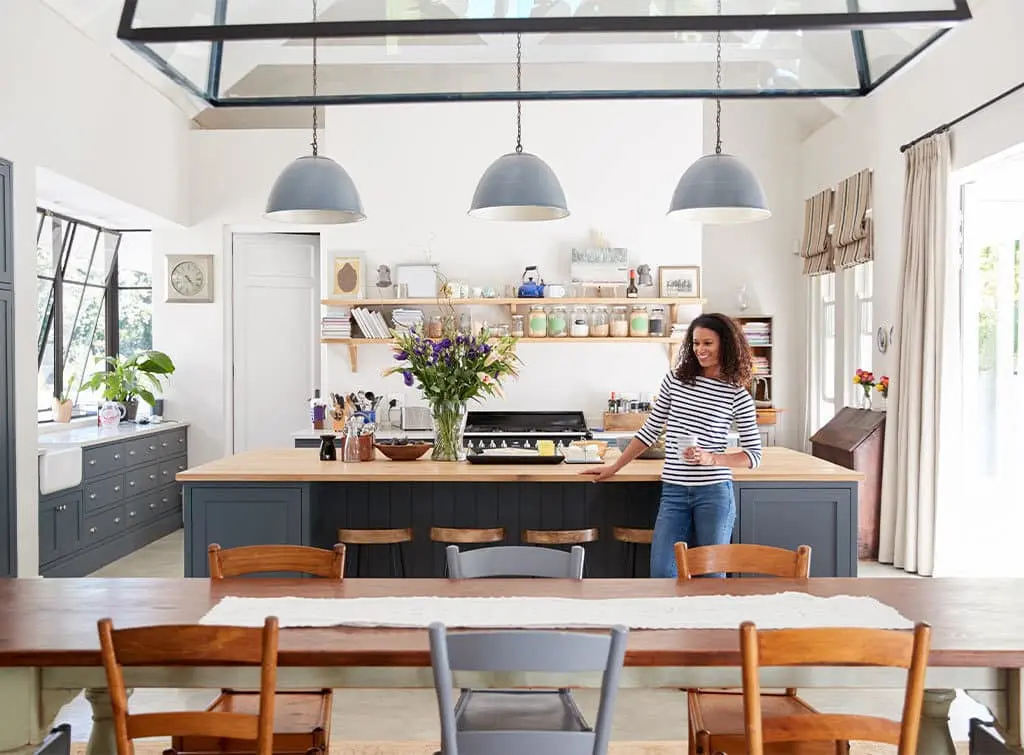
Neutral shades
You can't go wrong with soft greys and off-whites if you’re not looking to make a statement with your kitchen paint colour. Neutrals look as great in a modern or minimalist home as in a farmhouse kitchen.
Be careful not to go with a stark white in a large space. Set against a white ceiling, it can feel too bright and unhomely in some kitchens, especially if you have white LED lights. Soft cotton whites bring a softer feel.
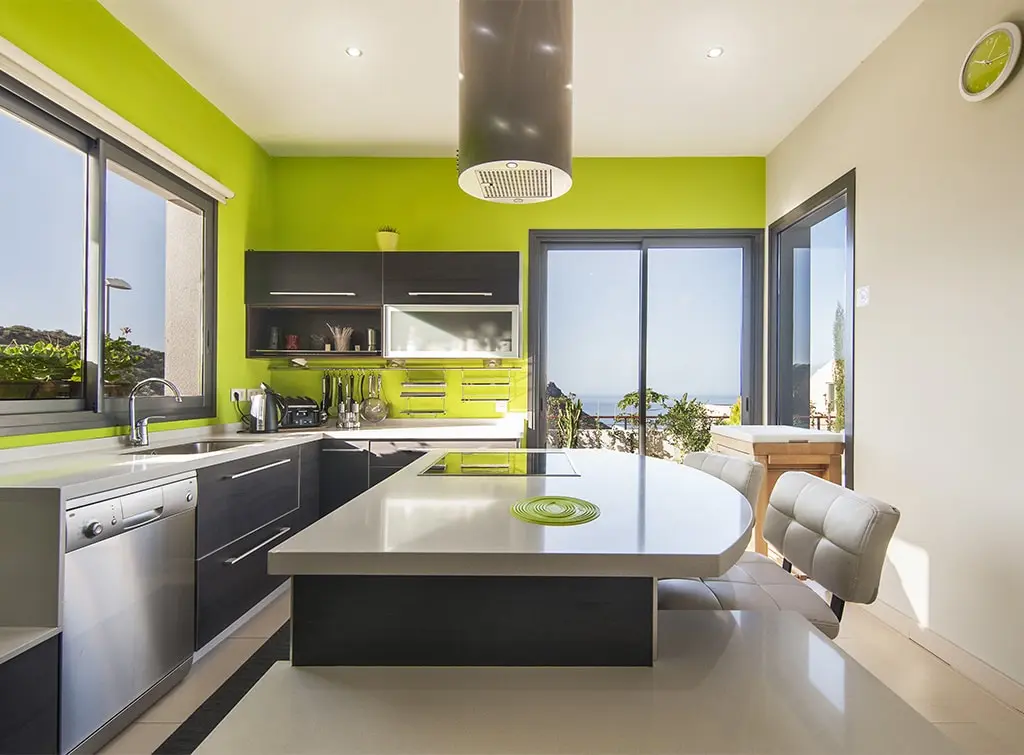
Bold accents
Statement shades like deep navy blue and forest green are having a heyday in UK kitchens recently. While we’ve seen these bold accents mostly on kitchen cupboards, why not consider giving the same treatment to your kitchen walls?
Or, for something more uplifting, how about a zesty lime? It looks great set against white or grey kitchen cupboards and will inject a hefty dose of personality.
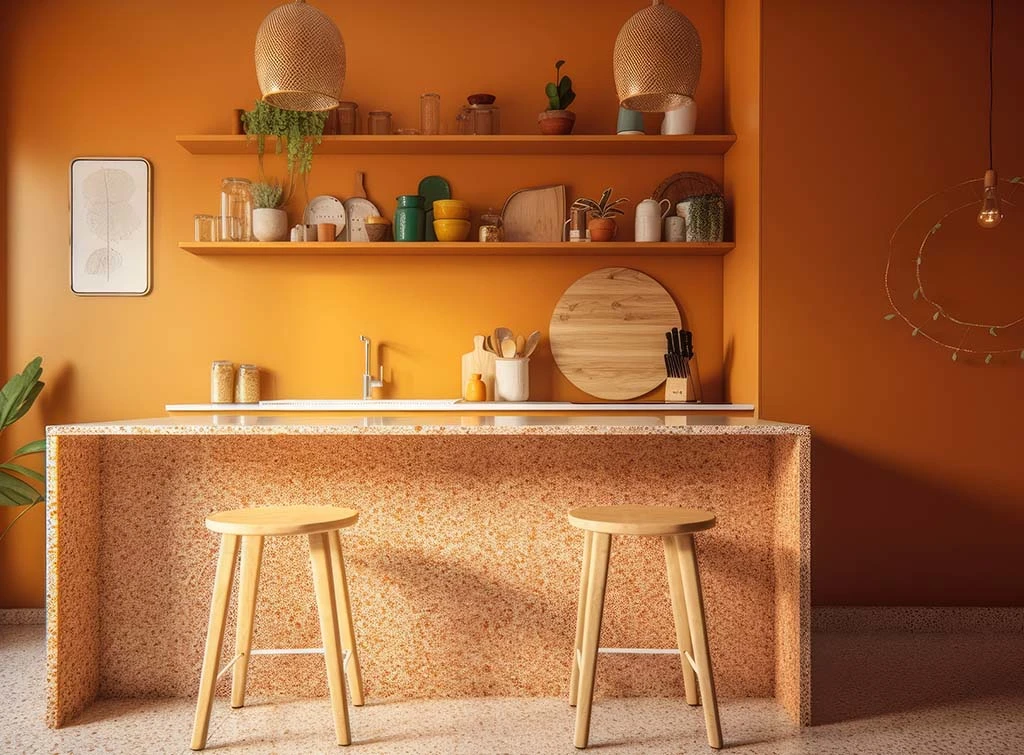
Warm tones
Fancy tapping into current paint décor trends? Then you’ll want something warm and inviting, like burnt orange, terracotta and peach. A deep terracotta or rusty orange will also make quite a statement.
But if you don't fancy going the whole hog, you can try colour zoning instead. That means painting one area of your kitchen in a particular colour and keeping the rest more neutral.
Due to Mediterranean design influences, colour zoning works particularly well in a dining area. Warm terracotta would help it feel inviting and atmospheric.
Still on the fence deciding what colour is right for you? Check out our paint trends guide for more inspiration.
Cost-saving ideas
Like many things in the home, you pay for what you get. Buying the highest-quality paint you can afford is key.
But before heading out to your local DIY store, here are some cost-saving tips to ensure you’re getting the most for your money:
Don’t be swayed by brand – The most premium brands aren’t necessarily the best, so you can often find that brands have the paint made by the same factory (take Dulux and Armstead, for instance)
Look for the word ‘trade’ on the tin! – It will cost a little more, but you’ll get a more hardwearing finish which will last longer, saving you money in the long run
Shop second-hand – If you only need to paint a small area in your kitchen, consider buying second-hand. You’ll be amazed how many people are selling off paints they decided weren’t the right colour for them. But only buy paints that have been sealed correctly
Tips for preparing your kitchen for painting
Have you chosen your finish and paint colour? Great! Now, it’s time to crack on with the hard work of painting your kitchen walls.
Like many jobs in the home, much of the work is in the prep. Cut corners, and you could end up with an unprofessional finish.
So, before picking up that paintbrush and roller, prepare for painting by following the below steps:
Apply decorators’ tape – It protects the edges of your kitchen wall and gives a clean finish around doorways, windows, skirting boards, ceilings and electrical sockets
Lay down protective sheets – They protect your kitchen furniture and flooring from paint splatters
Clean your walls – This is especially important in areas where grease may have built up. A damp cloth and mild soap detergent (or one cup of white vinegar in a bucket of warm water) should do the trick. But for tougher stains, you might want to invest in a specialist degreaser and cleaner, like sugar soap
Sand down surfaces – If there’s any bubbling to existing paintwork, you’ll want to sand this off to make sure you have a smooth finish when the new paint goes on
Once you’ve followed the above, you’re good to go! Not painted before? Check out our step-by-step guide for more advice on painting a wall perfectly.
Is it all starting to sound like more work than you’ve got the time or expertise for? Then, hiring a professional painter and decorator might be best. That’s all up next.
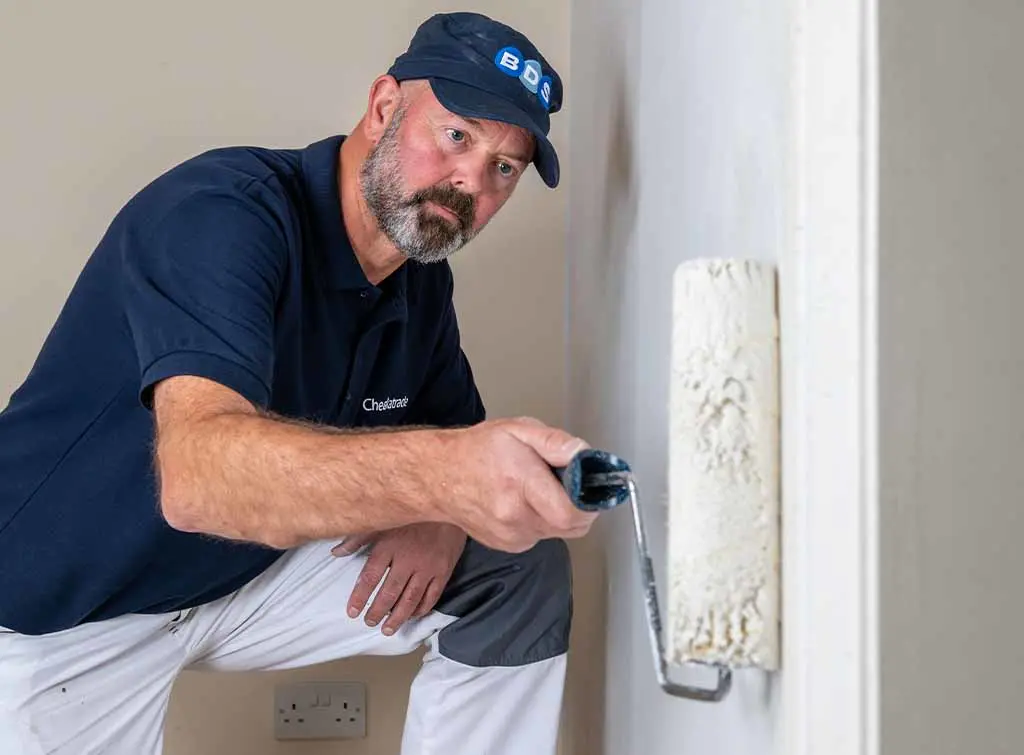
Finding trusted painters and decorators in the UK
A recommendation from friends and family is always a good place to start when looking for a painter and decorator.
However, if that’s not an option, searching for a specialist is easy with Checkatrade. Just follow these three simple steps:
Use a professional directory
Save time by using a professional directory (like Checkatrade!).
We're so confident in the quality of the trades on Checkatrade that if you book through us, we guarantee their work up to £1,000. Guaranteed for 12 months – Eligibility criteria and T&Cs apply.
Contact or pay a trade through Checkatrade and you’re covered by our 12-month guarantee of up to £1,000*

Read online reviews
A review from a previous customer is one of the best ways to check a tradesperson's professionalism.
At Checkatrade, we check all online reviews to ensure they're from real people and that trades meet our high standards.

We check the reviews on Checkatrade are from real people, and that trades meet our high standards.
Compare quotes
Get at least three quotes from experienced painters and decorators who are local to you. That way, you can be sure you're getting the best tradesperson and price for the job. Search your postcode to get started.
See the tradespeople we've checked and recommend for your job
How much does a painter and decorator charge?
The cost of painting your kitchen walls will depend on the size of your kitchen and how many coats you need. Where you live can also affect the price. Painters and decorators tend to charge more if you live in the Southeast or London.
However, to give you a general steer, the average painter and decorator's day rate is around £325 per day.
But if your kitchen is smaller and only needs one coat, painting it might only take half a day, so it's handy to know the average hourly rate, too. The average cost of a painter and decorator per hour is around £32.
If you can stretch your budget, make the most of your decorator's expertise by asking them to paint your skirting boards, ceilings or entrance door to your kitchen. You'll be amazed at the difference it can make.
Do you know the average size of your kitchen and exactly what you need painting? Why not use our handy cost calculator to get a more accurate quote for painting your kitchen?
Enter the overall size of your project (m2):
Add item (choose one)
Item | Avg Unit Cost | Your Cost |
|---|---|---|
£15.00 per m² | ||
£15.00 per m² | ||
£20.00 per m² | ||
£15.00 per m² |
Add items (specify quantity of each)
Item | Avg Unit Cost | Your Cost |
|---|---|---|
Painting radiator | £15.00 each | |
Painting interior door | £60.00 each | |
Painting exterior door | £225.00 each | |
Gloss painting skirting boards (hourly rate) | £27.50 each |
Estimated overall cost:
£0.00
Working with professional estimators, we collate cost estimates for the common home improvement and repair jobs in the UK. All the costs are estimates only and for accurate costs for your particular requirements, you are encouraged to reach out to professional tradespeople to receive a quote for your job. Read our disclaimer for more information.
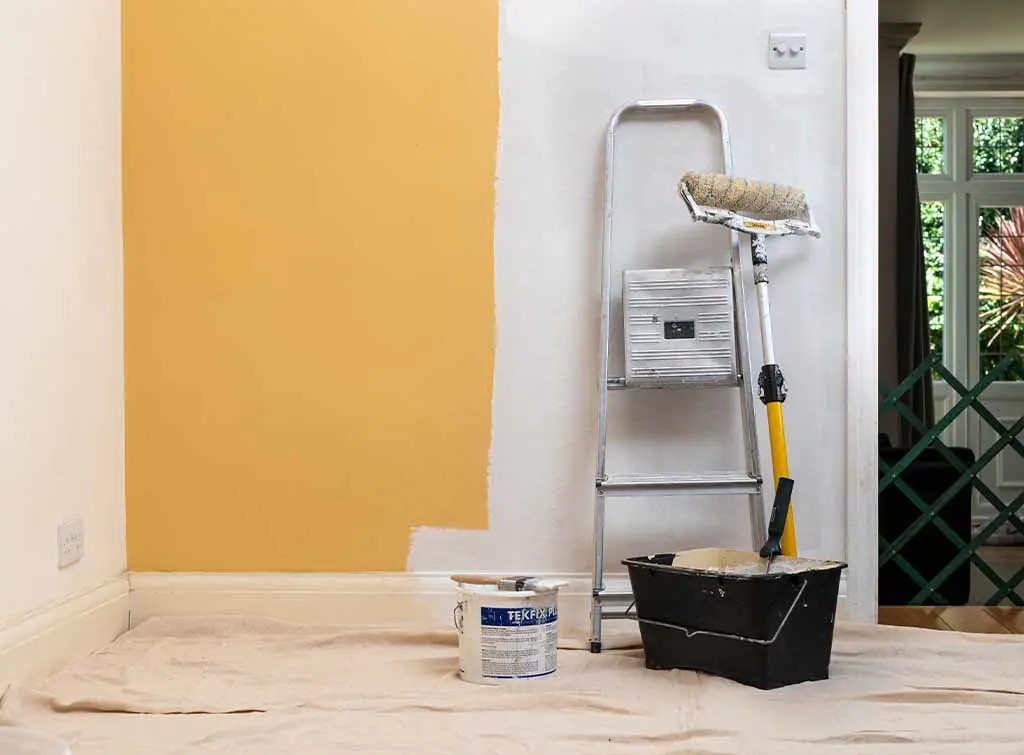
Key takeaways
You don’t necessarily need a specialist kitchen wall paint - other hardwearing paints can be just as effective, and hardwearing
Anti-mould and condensation-resistant trade paint if they are issues
More cost-effective brands can deliver the same results as premium
If you don't have time or skills, hire a painter or decorator for a professional finish
Kitchen wall paint: FAQs
How often should I repaint my kitchen walls?
Provided you use high-quality paint and apply the necessary coats, kitchen wall paint can last for five to seven years before you need to think about repainting. However, if condensation and ventilation are a problem, you might need to do it sooner.
Can I use regular paint in my kitchen?
No, a standard matt or silk emulsion won’t cut it. You’ll need something more hardwearing and wipeable, like eggshell, durable emulsion, or specialist paint.
How much does hiring a tradesperson for kitchen painting in the UK cost?
That all depends on the painter, the work required and whereabouts you are in the country. But, as a general steer, the average cost of a painter and decorator is around £32 per hour or £325 per day.
More Expert Advice Articles
More Painter / Decorator Articles
See the tradespeople we've checked and recommend for your job



